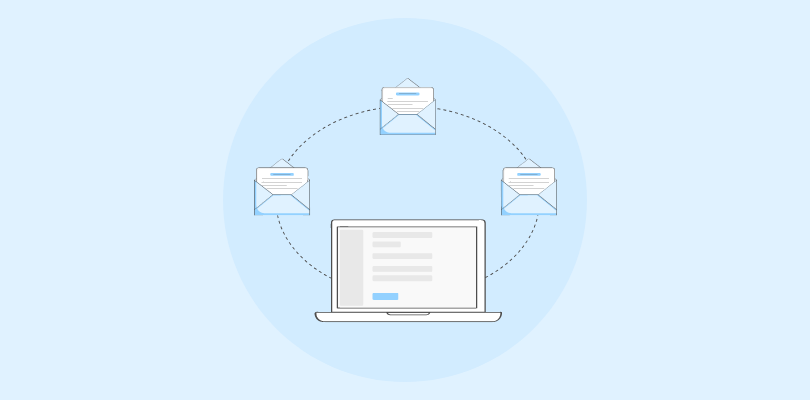The global auto dealership CRM software market is booming, expected to grow from $5.52 billion in 2023 to $6.13 billion by the end of 2024, with a remarkable 11.1% annual growth rate.
For any automotive business, staying ahead in this competitive market means having the right tools to manage customers, sales, and inventory. If you’re searching for the best CRM for automotive, you’re in the right place.
In this blog, I’ll explore the top CRM solutions for the automotive industry in 2025. From AI integration to cloud-based capabilities, these tools can streamline operations and boost dealership performance. Keep reading to find the perfect CRM to take your automotive business to the next level.
| CRM | Best For | Pricing |
|---|---|---|
| BIGContacts | Contact Management & Email Marketing | Forever free for small teams. Paid starts at $9.99/month. |
| Bonsai | Client Management | Starts at $25/user/month. |
| Hubspot | Centralizing Sales, Marketing, & Support Operations | Starts at $20/user/month. |
| SageCRM | Sales Pipeline Management | Custom pricing. |
| Maximizer CRM | Lead & Opportunity Management | Starts at $65/user/month. |
| AutoRaptor | 360° Communication | Custom pricing. |
| DealerSocket | Inventory Management | Custom pricing. |
Which Is the Best CRM for the Automotive Industry?
If you’re looking for a quick answer, here are my top 3 picks for the best automotive CRM:
Option 1: BIGContacts
This is the best choice for contact management and email marketing, especially for startups and SMBs. It offers powerful features for organizing customer information, tracking interactions, and sending targeted email campaigns.
Option 2: Bonsai
Ideal for client management, Bonsai streamlines managing customer relationships, from initial inquiry to post-sale follow-up. Centralize customer data and communication in one place, track leads, manage sales pipelines, and provide exceptional service.
Option 3: Sage CRM
If sales pipeline management is your priority, Sage CRM is a top contender. It offers effective tools for tracking leads, managing opportunities, and forecasting sales, helping you optimize your sales process and drive revenue growth.
7 Best CRM for Automotive Industry
I’ve gathered a list of top tools that provide advanced features to help you enhance your customer relationships. With these tools, the education industry can achieve higher efficiency and customer loyalty.
1. BIGContacts – Best for Contact Management & Email Marketing for Startups & Small & Medium Businesses
I’ve been using BIGContacts CRM for a few months now, and I’m really happy with it. It is an ideal solution for organizing contacts and executing precise email marketing campaigns. What really stood out was its ease of use in managing contacts and sending targeted email campaigns.
The contact management feature kept track of customer information, activities, and communication history all in one place. Its automation capabilities for follow-ups saved me a ton of time. It’s a great tool for managing my contacts, tasks, and calendars. I liked that it’s easy to use, even for someone who is not tech-savvy.
This tool offered excellent lead tracking and customer follow-up features for the automotive industry, which are essential for nurturing leads in such a competitive environment. The email marketing feature also helped me create targeted campaigns for different client segments, something automotive businesses can really benefit from.
What You’ll Like:
- Contact segmentation into specific groups to send personalized bulk emails for targeted outreach
- Custom web forms to capture leads and automatically store their details in the CRM
- 360° view of every contact, including emails, transactions, files, and activities, enhancing visibility and workflow efficiency
- Sales pipeline management to track leads, monitor progress, and close deals faster
- Awesome human support 24/7 via phone, chat, and knowledge base
- The interface is user-friendly and helps in navigating easily
What You May Not Like:
- No downloadable or on-premise version
- No dedicated account manager for the free plan, unlike the paid
Pricing:
- Forever free for small teams. Paid starts at $9.99/month.
2. Bonsai – Best for Client Management
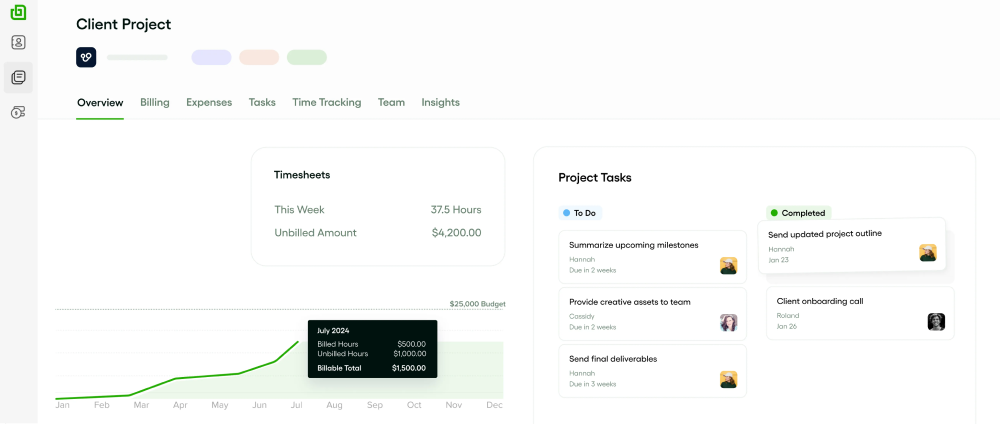
Image source: Bonsai
I’ve been using Bonsai for a while now. It helps manage clients and organize work tasks, especially in industries like automotive, where managing multiple customer touchpoints is critical.
I used Bonsai’s automated workflows to keep client communication and project tasks in order, which saved me a lot of time. Its proposal and contract management features were particularly helpful in the automotive industry, which helped me to draft and manage agreements with car buyers and service clients efficiently.
This automotive crm software saved me a ton of time and helped me to improve my client communication. I also liked how Bonsai’s invoicing tool helped me track payments seamlessly, making it one of the best CRM for automotive businesses.
What You’ll Like:
- Client portal to share important files and updates with clients through their own branded portal
- Proposal and contract management feature to help you close deals faster and more efficiently
- Detailed reports to track project progress and client communication in real-time
- Easy invoicing with customizable templates that speed up billing and ensure professional-looking invoices
What You May Not Like:
- Limited customization options in the dashboard make it harder to tailor the interface to specific business needs
- The mobile app occasionally glitches, which can disrupt workflow when managing tasks on the go
Pricing:
- Starts at $25/user/month.
3. Hubspot – Best for Centralizing Sales, Marketing, & Support Operations
Image source: Hubspot
I found HubSpot CRM incredibly helpful for centralizing different aspects of business operations. It’s like having one giant toolbox for everything you need to nurture leads, close deals, and keep your customers happy.
The tool made it easy to manage leads, track customer interactions, and automate marketing processes—all from one platform. For the automotive industry, particularly used car dealers, HubSpot helped me to create personalized marketing campaigns, track sales opportunities, and automate follow-up emails for potential buyers.
Its pipeline management was perfect for tracking each vehicle’s sales journey. And because HubSpot integrates with so many other business tools you might already use, it can become your central hub for managing pretty much everything. In my experience, HubSpot truly stood out as one of the top CRM for automotive businesses.
What You’ll Like:
- Automated email sequences to nurture leads and keep them engaged with the dealership
- Live chat function to chat directly with potential customers
- Marketing tools to create landing pages and online ads to capture leads from your website
- User-friendly interface for managing sales pipelines, making it easier to track and move leads through the sales process efficiently
What You May Not Like:
- Workflow automation can be complex and requires a learning curve
- Email tracking notifications can be inconsistent at times
Pricing:
- Starts at $20/user/month.
4. SageCRM – Best for Sales Pipeline Management
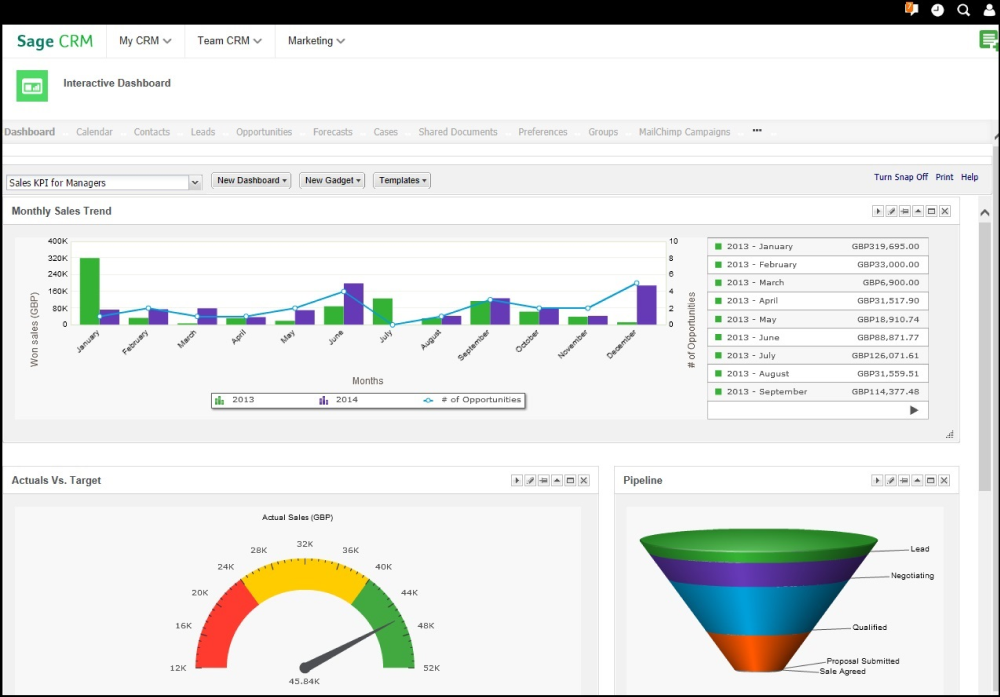
Image source: Greytrix
I found SageCRM to be incredibly effective in managing complex sales pipelines. Its customizable dashboard tracked opportunities and leads in real-time, which made handling multiple deals much easier.
What stood out was the detailed customer information feature, which was truly helpful for automotive businesses. The built-in reporting forecasted sales trends accurately, which is crucial in the auto industry.
As a CRM for auto dealers, SageCRM offered specific features that helped streamline dealership management. I could track customer interactions from inquiry to post-sale, which is vital for building long-term relationships in the auto sector. The lead management features assigned leads to the right sales reps and managed follow-ups effectively, improving customer satisfaction. Overall, SageCRM proved to be a top-tier CRM for automotive businesses.
What You’ll Like:
- Lead capture feature to extract leads from multiple sources, such as your website, social media, and email marketing campaigns
- Opportunity management to track opportunities from start to finish, including the probability of closing and the estimated closing date
- Built-in sales forecasting helps predict future sales trends, enabling more informed decision-making and better inventory management
- Detailed reporting with a variety of reports that help you track your sales performance.
What You May Not Like:
- The setup and customization process was quite complex for non-technical users, which could lead to delays in implementation
- The user interface felt somewhat outdated, which could slow down navigation and reduce overall user efficiency
Pricing:
- Custom pricing.
5. Maximizer CRM – Best for Lead & Opportunity Management
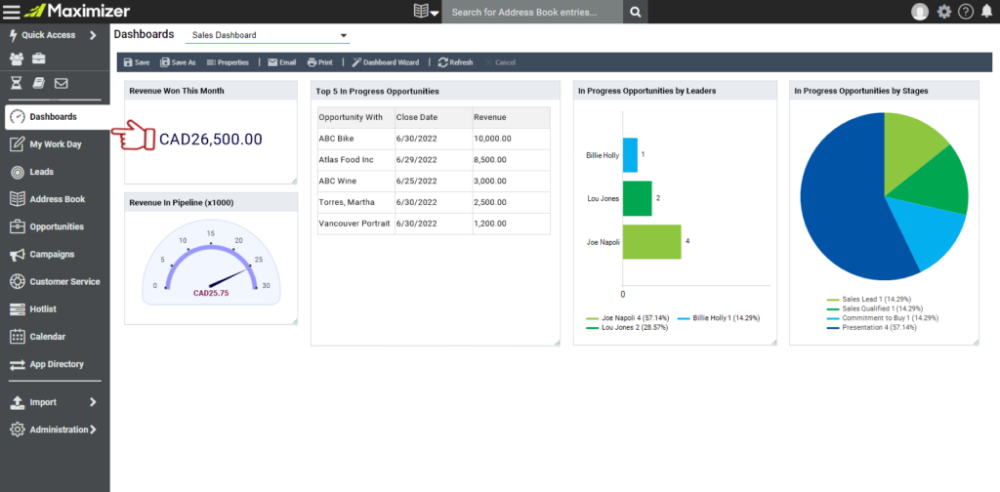
Image source: Maximizer
Maximizer CRM impressed me with how effortlessly it turned lead management into a well-organized and efficient workflow. Its effective lead tracking helped me to quickly capture, score, and prioritize potential customers.
The sales pipeline management visually organized each stage of the sales process. For automotive businesses, this tool excels with its tailored CRM solutions. The ability to track customer interactions, schedule test drives, and manage service appointments was highly valuable.
Maximizer’s built-in contact and task management features also make it a top choice among automotive CRM providers, ensuring seamless communication with customers, whether for sales or service inquiries. It’s ability to customize reports and dashboards helps automotive teams stay on top of performance metrics and customer data.
What You’ll Like:
- Repetitive task automation, such as sending follow-up emails, so you can save time and focus on closing deals
- Lead and opportunity tracking system that boosts sales by allowing you to capture and prioritize prospects with ease
- Flexible sales pipelines to visually track each stage and help you manage deals more efficiently
- Customizable dashboards to see the metrics that are most important to you
What You May Not Like:
- Data import/export options can be cumbersome, especially for larger datasets
- Integrating with newer tools or platforms can be tricky and often needs custom development to work smoothly
Pricing:
- Starts at $65/user/month.
6. AutoRaptor – Best for 360° Communication
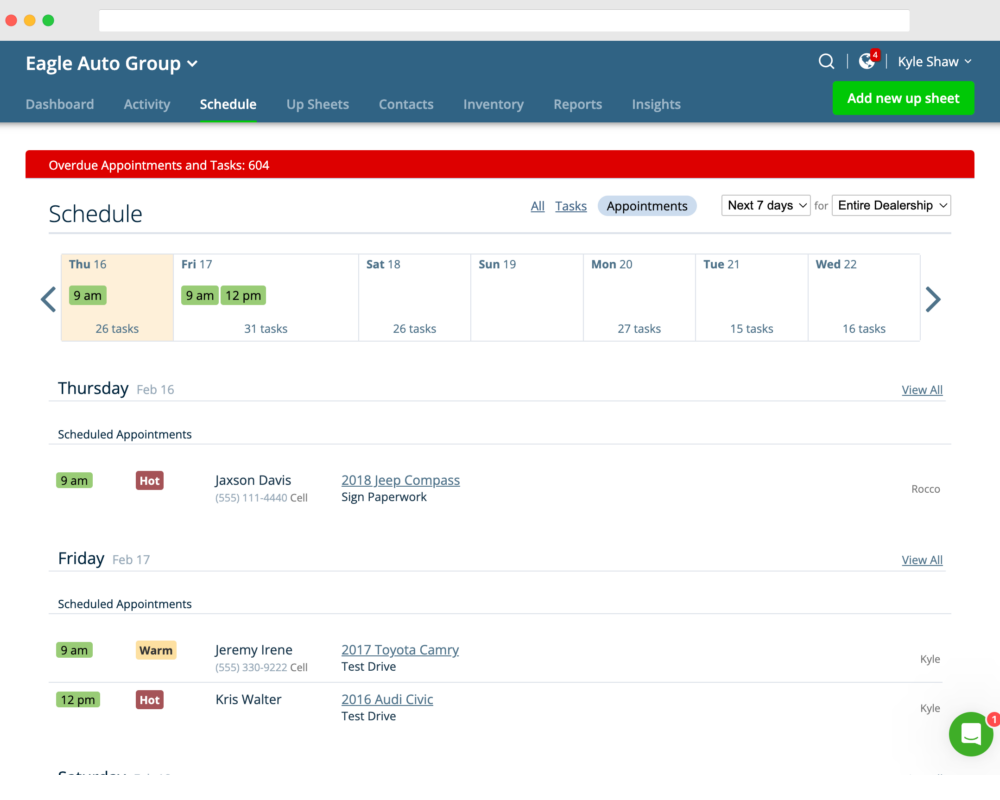
Image source: AutoRaptor
If you’re in the car business, you know how important it is to stay connected with your leads and customers. AutoRaptor truly shines as a CRM for automotive businesses with its intuitive 360° communication tools.
It streamlined how I interacted with leads through email, text, and phone calls, all from one platform. It automated follow-ups, which made managing customer relationships much easier. The lead management feature helped me track customer inquiries in real-time, making it seamless to convert leads into sales.
The customizable reporting tools also gave me insights into sales performance, and the mobile app made it easy to manage tasks on the go. If you’re in the automobile industry, AutoRaptor is the kind of CRM that simplifies day-to-day sales processes and enhances communication with customers. It is undoubtedly one of the best CRM tools for the automotive industry, helping businesses engage efficiently with potential buyers.
What You’ll Like:
- Real-time lead tracking helps you respond faster to inquiries, increasing the chances of converting leads into sales
- Automated follow-ups for leads ensure no customer is missed, boosting engagement and improving conversion rates
- Customizable reporting tools provide key insights into sales performance
- Integrated texting and emailing streamline communication, helping you respond to leads faster and close deals more efficiently
What You May Not Like:
- Customer support is not available 24/7, which can cause delays
- Reporting features lack advanced customization options
Pricing:
- Custom pricing.
7. DealerSocket – Best for Inventory Management
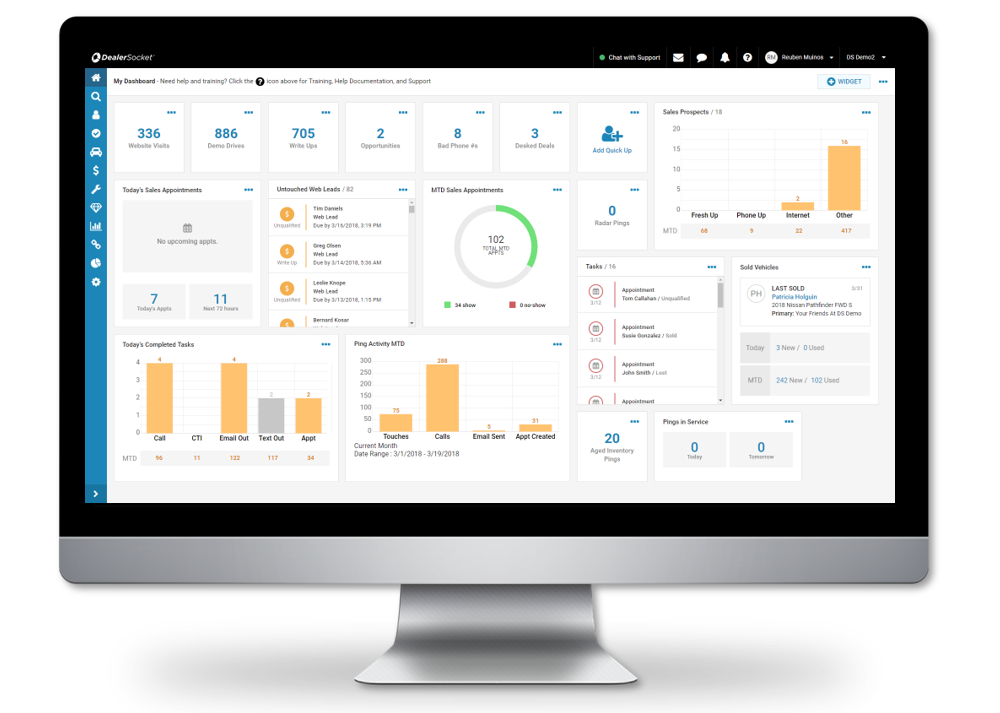
Image source: DealerSocket
When I used DealerSocket, I found it to be an incredibly effective car dealership CRM, especially for handling inventory. The tool made it easy to track and manage vehicle inventories in real time, which helped streamline my workflow.
It integrated with other dealership processes, from sales to service. DealerSocket’s reporting tools offered detailed insights into inventory turnover, helping me stay ahead in the competitive automotive business. It also has some great features that are specifically designed for the automotive industry, such as the ability to track leads, manage customer relationships, and generate reports.
The system was clearly built with dealerships in mind, making it one of the best CRM for automotive businesses, thanks to its industry-specific tools like vehicle sourcing and inventory management.
What You’ll Like:
- Real-time inventory tracking ensures up-to-date stock information, allowing for quicker and more informed decision-making
- Detailed reporting tools to track inventory performance, allowing for more informed decisions and better forecasting
- Tailored lead management features designed specifically for automotive sales, helping to close deals faster and improve customer follow-up efficiency
- Sales pipeline management to track your leads and deals from start to finish and identify areas for improvement
What You May Not Like:
- Customization options felt limited for specific dealership needs
- The mobile app experience wasn’t as smooth as the desktop version
Pricing:
- Custom pricing.
Evaluation Criteria
The evaluation of products or tools chosen for this article follows an unbiased, systematic approach that ensures a fair, insightful, and well-rounded review. This method employs six key factors:
- User Reviews / Ratings: Direct experiences from users, including ratings and feedback from reputable sites, provide a ground-level perspective. This feedback is critical in understanding overall satisfaction and potential problems.
- Essential Features & Functionality: The value of a product is ascertained by its core features and overall functionality. Through an in-depth exploration of these aspects, the practical usefulness and effectiveness of the tools are carefully evaluated.
- Ease of Use: The user-friendliness of a product or service is assessed, focusing on the design, interface, and navigation. This ensures a positive experience for users of all levels of expertise.
- Customer Support: The quality of customer support is examined, taking into account its efficiency and how well it supports users in different phases – setting up, addressing concerns, and resolving operational issues.
- Value for Money: Value for money is evaluated by comparing the quality, performance, and features. The goal is to help the reader understand whether they would be getting their money’s worth.
- Personal Experience / Experts’ Opinions: This part of the evaluation criteria draws insightful observations from the personal experience of the writer and the opinions of industry experts.
Transform Your Automotive Business with the Right CRM Solution
When transforming your automotive business, choosing the right CRM can make all the difference. A CRM tailored to the automotive industry can streamline operations, enhance customer relationships, and help you easily manage inventory. From lead management to sales tracking, the right CRM for automotive dealerships can optimize your entire workflow, ensuring you stay competitive in a fast-paced market.
One of the key benefits of using a specialized CRM is its ability to automate routine tasks like follow-ups and inventory updates, freeing up valuable time for your sales team to focus on closing deals. Moreover, a CRM system can improve customer communication by providing a 360° view of each interaction, ensuring that no opportunity is missed.
If you’re searching for a reliable solution, BIGContacts stands out with its powerful features and user-friendly interface. Not only does it integrate seamlessly with other dealership tools, but it also offers a cost-effective pricing structure, including a forever-free plan to get you started without any initial investment. BIGContacts is definitely worth considering for your automotive business.
Learn More About the Best CRM for Auto Parts Business
What is CRM for the automotive business?
CRM for the automotive business is a tool designed to help car dealerships manage customer relationships, sales, and inventory more efficiently. It streamlines communication, tracks leads, and automates tasks like follow-ups and service reminders. Automotive CRM software helps businesses stay organized, improve customer service, and boost overall sales performance.
Read more: What Is CRM? [The Ultimate Guide for Businesses]
What are the benefits of auto CRM software for car dealerships?
Auto CRM software offers car dealerships several benefits, like streamlining sales processes, improving customer communication, and organizing leads efficiently. It helps track customer interactions, automates follow-ups, and boosts overall productivity. With Automotive CRM, dealerships can enhance their customer experience and close deals faster, making day-to-day operations more efficient.
Read more: Benefits of CRM: Why CRM Is Important for Your Business
What are the features to look for in an automotive CRM?
When choosing an automotive CRM, look for CRM features like inventory management, lead tracking, and sales automation to streamline operations. Customer communication tools, integration with dealership systems, and reporting features are also essential for managing your business efficiently. Make sure it supports appointment scheduling and has mobile access for flexibility.
I’m a small, independent dealer. Do I really need a CRM?
Yes, even as a small, independent dealer, a CRM can be quite helpful. It helps you keep track of leads, manage customer interactions, and stay organized. With everything in one place, you can focus on building relationships and growing your business, making your daily operations smoother and more efficient.
What’s the difference between a CRM and a DMS?
A CRM (Customer Relationship Management) focuses on managing customer interactions, sales, and marketing, helping you build better relationships with clients. A DMS (Dealer Management System) is more specific to car dealerships, handling inventory, service, and sales operations. Essentially, CRM is about customers, while DMS manages the entire dealership’s operations.
How much do car dealer CRMs cost?
Car dealer CRMs typically cost anywhere from $50 to $300 per month, depending on the features and the size of your dealership. Some providers also offer tiered pricing based on the number of users or cars managed. Many CRMs offer free trials or demos, so you can test them before committing.
Read more: Pricing Comparison of the 10 Best CRM Tools
How to choose the best CRM software for the automotive business?
To choose the best CRM software for your automotive business, look for features like inventory management, lead tracking, and customer communication tools. Make sure it integrates well with your existing systems and supports automation to save time. Also, consider ease of use, customer support, and pricing that fits your budget.
FREE. All Features. FOREVER!
Try our Forever FREE account with all premium features!







